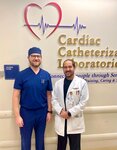Wind: 10.4 mph, W
Welcome to our new web site!
To give our readers a chance to experience all that our new website has to offer, we have made all content freely avaiable, through October 1, 2018.
During this time, print and digital subscribers will not need to log in to view our stories or e-editions.


Memorial Medical Center (MMC) has opened its first cardiac electrophysiology (EP) lab.
“Heart disease is the leading cause of death for both men and women in the United States, and EP studies help doctors understand why patients’ hearts are beating too fast or too slowly,” MMC said in a news release. “An irregular heartbeat (arrhythmia) can lead to heart complications, fatigue, congestive heart failure or stroke. An EP study helps clinicians determine the best treatment plan for patients – whether that is medication, a pacemaker, a defibrillator, cardiac ablation or procedure.”
The EP lab was made possible through a $973,000 investment for equipment and installation at MMC, the news release said.
“This is truly an exciting time for Memorial, Las Cruces and southern New Mexico,” said MMC CEO John Harris. “The expansion of our heart and vascular service line to include cardiac electrophysiology is part of our commitment to invest in our community and provide high-end cardiovascular services that one only sees in large metropolitan areas. We want our community to have access to top quality care by experienced physicians, so our patients do not have to travel out of Las Cruces for care.”
The lab addition comes in conjunction with the recruitment of cardiac electrophysiologist Dr. Steven Hamilton to the MMC medical team, the news release said.
An electrophysiologist is a cardiologist with extensive training in the diagnosis, management and treatment of heart arrhythmias and the electrical activities of the heart, including atrial fibrillation (AFib). EPs work with patients’ general practitioners and cardiologists to help address AFib, generally when treatment with medications fails or when AFib persists after initial treatment, MMC said.
AFib is the most common cardiac arrhythmia, currently affecting up to six million Americans, the news release said. Stroke is the most common complication of AFib, and AFib-related strokes are also more frequently fatal and disabling.
EP studies test the heart’s electrical system and look for any short circuits that could cause arrhythmias, MMC said. If a short circuit is found, an ablation may be performed to burn out the abnormality. Catheter ablation targets the areas of the heart that generate faulty electrical pulses that cause rapid heartbeat or AFib. By neutralizing and blocking these areas, the pulses are controlled, and a normal heartbeat returns.
MMC is a 199-bed, full-service acute care hospital at 2450 S. Telshor Blvd.
Visit mmclc.org.